June 2, 2025 | 19:58 GMT +7
June 2, 2025 | 19:58 GMT +7
Hotline: 0913.378.918
June 2, 2025 | 19:58 GMT +7
Hotline: 0913.378.918
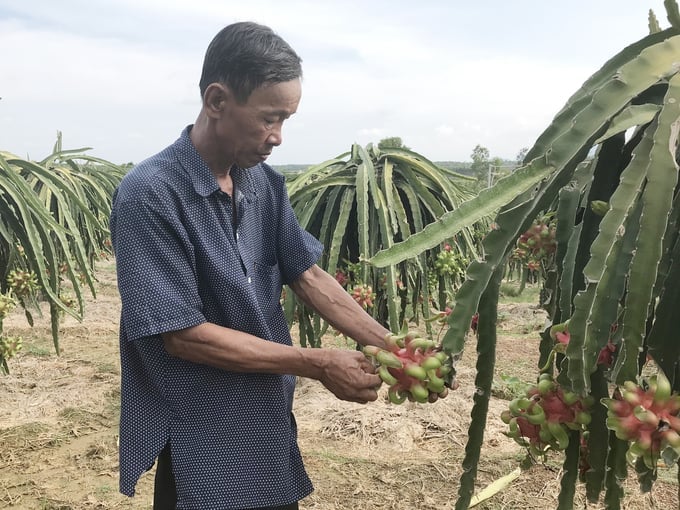
Binh Thuan farmers check dragon fruit before harvesting. Photo: Nguyen Thuy.
Dragon fruit is easy to grow, has high yields, is drought-resistant and adapts to soil, alkaline and saline soils, so it is chosen for cultivation in the southern provinces. According to statistics from the Ministry of Agriculture and Rural Development, from 2010 to 2020, the area of dragon fruit increased by 15.1%/year, equivalent to 4,600 hectares/year. In 2020, the dragon fruit area reached its highest level at 65,000 hectares. However, after 2020, due to the Covid-19 pandemic and China's Net Zero policy, the area of Vietnamese dragon fruit in 2021 decreased by 1,500 hectares, and in 2022 decreased by 9,200 hectares compared to 2020.
By the end of 2023, Vietnam had 55,000 hectares of dragon fruit, with over 1.2 million tons of output, mainly in 3 provinces: Binh Thuan, Long An, Tien Giang. White-fleshed dragon fruit varieties are grown primarily in Binh Thuan; Red-fleshed dragon fruit varieties are mainly grown in Long An, Tien Giang and Dong Nai.
Vietnam's dragon fruit export value continuously increased from US$ 57.15 million in 2010 to over US$ 100 million in 2011, exceeding US$ 1 billion from 2017 to 2020. Also, dragon fruit is a product that accounts for mainly over 30% of the export value of the fruit and vegetable industry continuously from 2015 - 2020.
Currently, the total area of dragon fruit is estimated at 140,000 - 145,000 hectares. In particular, Asia focuses mainly on China, Vietnam, India, Indonesia, Thailand, Taiwan, Malaysia... In addition, the Middle East region has Israel; The Americas region includes Ecuador, Nicaragua, Mexico, and Colombia.
Vietnam, for quite a long time, has been the world's leading country in terms of area, output and export of dragon fruit. For many years, dragon fruit has been in the industry group that brings in billions of dollars for Vietnamese agricultural products. However, China's dragon fruit growing area increased rapidly from 3,400 hectares in 2011 to 67,000 hectares in 2021 (output reached 1.6 million tons), surpassing Vietnam. This is considered one of the reasons why Vietnamese dragon fruit exports gradually lost their advantage in China.
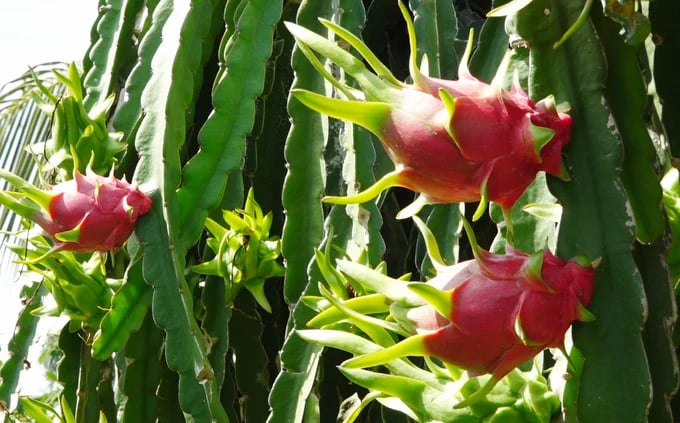
Vietnamese dragon fruit has many competitors in the export market. Photo: Nguyen Thuy.
According to data from the General Department of Customs, in January 2024, dragon fruit exports reached nearly US$ 64 million, an increase of almost 73% compared to December 2023 and an increase of 36.7% over the same period in 2023. This was an optimistic signal for Vietnamese dragon fruit.
As one of the provinces with the most significant area and output of dragon fruit in the country, with 27,000 hectares and an output of about 550,000 tons/year, Binh Thuan has 653 dragon fruit growing area codes and about 325 packaging facilities codes. Being proactive about growing area codes and packaging facilities helps farmers and businesses become more aware of the issues of ensuring food safety, plant quarantine, and strengthening supervision to ensure proper production processes, stabilizing product quality and creating trust in importing countries.
According to Mr. Huynh Canh, Chairman of Binh Thuan Dragon Fruit Association, Binh Thuan dragon fruit has been registered as a geographical indication. It has been protected by 13 countries and territories such as the US, Japan, Korea, Thailand, and Singapore, England, France, Germany, Netherlands, China... The province currently has 13 processing facilities processing dried and dried dragon fruit, all kinds of dragon fruit juice, dragon fruit wine, and dragon fruit candy, with a total capacity of processing dragon fruit products of about 37,800 tons/year.
Vietnam has many advantages in terms of land and climate conditions that are suitable for developing dragon fruit production. Over time, dragon fruit production nationwide has formed concentrated areas, creating conditions for applying technical advances and organizing the production and consumption of products.
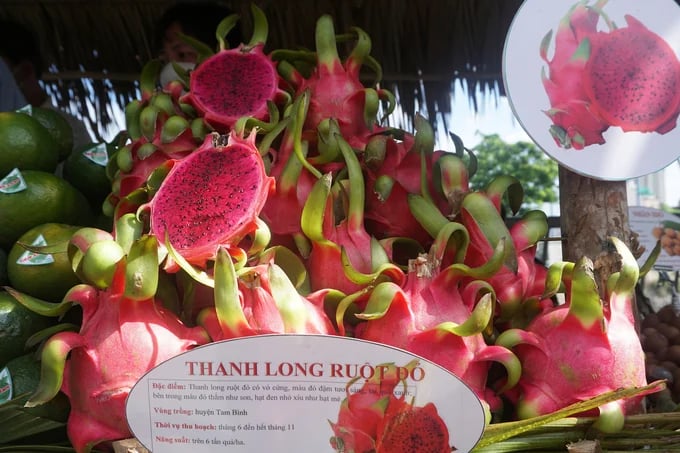
Red-flesh dragon fruit is prevalent in many markets. Photo: Nguyen Thuy.
However, Vietnamese dragon fruit still faces many difficulties as requirements for quality, food safety, and design of fresh dragon fruit for export are increasingly strict. Besides, the production link between businesses and people is still unsustainable; few enterprises participate in the link chain to meet export standards to large, demanding markets. Advanced packaging and storage facility systems, lack of deeply processed products, limited technology...
In addition, climate change, the emergence and development of many types of pests and diseases, and rising fertilizer prices affect production investment, prices, food safety and competitiveness.
Vietnamese dragon fruit also faces a big challenge when the Chinese market requires increasingly high-quality standards when exporting officially. In addition, India, a large potential market, has a policy of increasing output to serve domestic demand from 3,000 hectares to 50,000 hectares in the next 5 years. Therefore, it is forecast that the dragon fruit market will face difficulties in the coming time if the dragon fruit area is increased without efforts to improve quality and meet the standards of import markets.
For Vietnam's dragon fruit value chain to develop sustainably, the Ministry of Agriculture and Rural Development orients the development of the dragon fruit industry based on promoting the potential and advantages of ecological regions, especially in 3 essential dragon fruit growing provinces, including Binh Thuan, Long An and Tien Giang.
Translated by Tuan Huy

(VAN) Businesses in Vietnam are attempting to export rice to the United States ahead of the implementation of reciprocal tariffs, while remaining their optimism regarding this critical market.
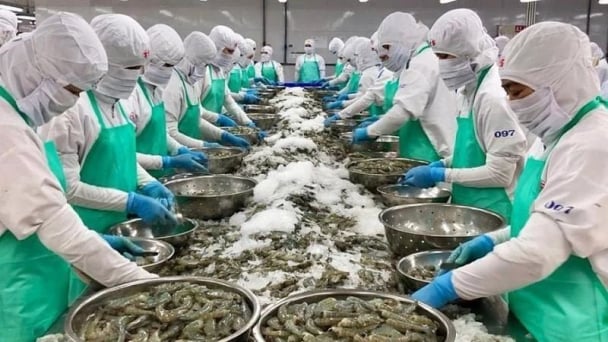
(VAN) From containers of cashew nuts, shrimp to in-depth technical dialogues, agricultural cooperation between Vietnam and the United States is entering a period of sustainable and two-way development.

(VAN) After the talks on May 28, Vietnam successfully exported its first batch of frozen durians to China, marking a new milestone in agricultural trade cooperation between the two countries.
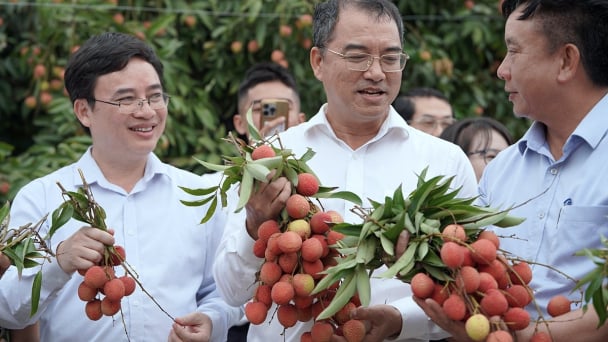
(VAN) Several major companies, such as Red Dragon and Ameii Vietnam, have signed purchasing agreements for the 2025 season, targeting markets including Japan, the United States, and the EU.
/2025/05/30/5010-5-173638_943.jpg)
(VAN) On May 29, at the GO! My Tho Trading Center, the Tien Giang Department of Industry and Trade, in collaboration with Central Retail Corporation, held the opening ceremony of the 3rd Fruit Festival 2025.

(VAN) Reciprocal tariffs are exerting pressure on U.S. exports, prompting Vietnamese firms to shift their focus to Muslim markets, Thailand, and Brazil.
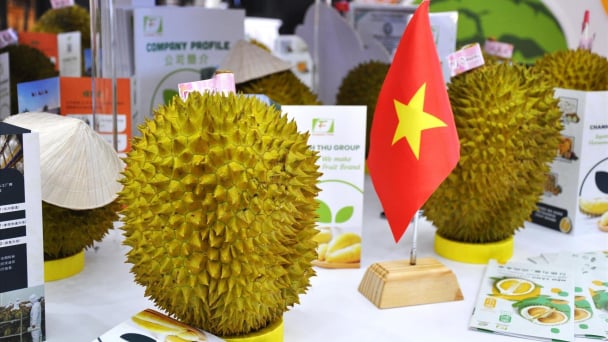
(VAN) A free booth for two years at Xinfadi, Beijing's largest wholesale market, will be allocated to Vietnam's agricultural products.